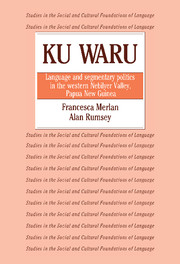Book contents
- Frontmatter
- Contents
- List of illustrations
- List of tables
- List of abbreviations
- Preface and acknowledgments
- 1 Introduction
- 2 The setting
- 3 Some aspects of Ku Waru segmentary sociality
- 4 Ceremonial exchange and marriage in the western Nebilyer Valley
- 5 Some linguistic structures of segmentary politics
- 6 Warfare compensation payment to Laulku: an analysis
- 7 Compensation at Palimung and the Kulka women's club
- 8 The events in perspective
- 9 Perspectives on ‘event’
- Appendix A Transcript of proceedings at Kailge on July 24, 1983
- Appendix B Grammatical sketch of Bo Ung, Ku Waru dialect
- Appendix C The conduct of warfare
- Appendix D Ku Waru metalinguistic expressions
- Chapter notes
- Glossary
- References
- Index
- Plate section
3 - Some aspects of Ku Waru segmentary sociality
Published online by Cambridge University Press: 30 December 2009
- Frontmatter
- Contents
- List of illustrations
- List of tables
- List of abbreviations
- Preface and acknowledgments
- 1 Introduction
- 2 The setting
- 3 Some aspects of Ku Waru segmentary sociality
- 4 Ceremonial exchange and marriage in the western Nebilyer Valley
- 5 Some linguistic structures of segmentary politics
- 6 Warfare compensation payment to Laulku: an analysis
- 7 Compensation at Palimung and the Kulka women's club
- 8 The events in perspective
- 9 Perspectives on ‘event’
- Appendix A Transcript of proceedings at Kailge on July 24, 1983
- Appendix B Grammatical sketch of Bo Ung, Ku Waru dialect
- Appendix C The conduct of warfare
- Appendix D Ku Waru metalinguistic expressions
- Chapter notes
- Glossary
- References
- Index
- Plate section
Summary
THE NATURE OF KU WARU SEGMENTARY STRUCTURES
As already suggested by our opening vignette in Chapter 1, social action among the Ku Waru people (as in many other parts of the New Guinea Highlands) is structured partly in terms of named, quasi-agnatic social identities which bear some formal similarities to the segmentary lineages of classical descent theory (as in, e.g. Fortes 1953). Among Nebilyer people, those social identities are known generically as talapi. Talapi figure centrally in the events analyzed in Chapters 6 to 8, and so it is important here to provide full background details concerning the nature of these identities in general, and the history and structure of some of the particular talapi which are involved in those events.
In most respects, Ku Waru segmentary structures are similar or identical to those which have been extensively discussed in the Melpa ethnography mentioned in section 2.4 above. In view of this similarity, and given the extraordinarily high quality and thoroughness of the Strathern corpus, the present account of talapi will not be offered as a general introduction to the subject (for which, see A. Strathern 1972), but as an attempt to explicate aspects of talapi structure which are particularly relevant for our analysis of the events in Chapters 6 and 7, and for the model to be developed out of it in Chapter 8. To that end, and given the sort of controversies we have already reviewed concerning talapi-like social identities among the neighboring Enga and elsewhere in the Highlands (section 1.2), what is required here is less a matter of new empirical detail, than of how to construe certain largely familiar details in relation to existing anthropological models.
- Type
- Chapter
- Information
- Ku WaruLanguage and Segmentary Politics in the Western Nebilyer Valley, Papua New Guinea, pp. 34 - 56Publisher: Cambridge University PressPrint publication year: 1991

